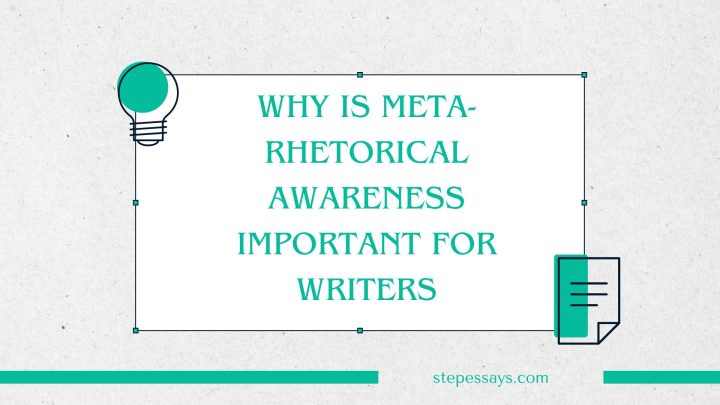Introduction:
Language, the quintessential tool of human communication, serves as the canvas upon which writers craft their masterpieces. Within this intricate tapestry of words lies the art of rhetoric, the skillful manipulation of language to convey meaning, persuade, and evoke emotions. However, beyond the basic mastery of rhetorical techniques, lies a deeper understanding known as meta-rhetorical awareness. This awareness transcends the surface-level mechanics of language, delving into the underlying structures, implications, and cultural contexts that shape communication. In this discourse, we shall explore the profound significance of meta-rhetorical awareness for writers, elucidating its role in enhancing clarity, fostering empathy, and empowering communicative efficacy.

meta-rhetorical awareness
Understanding Meta-Rhetorical Awareness:
Meta-rhetorical awareness encompasses a heightened sensitivity towards the intricate dynamics of rhetoric itself. It involves the recognition and analysis of rhetorical strategies, devices, and their interplay within different contexts. Unlike conventional rhetorical awareness, which primarily focuses on the application of techniques, meta-rhetorical awareness involves a reflective engagement with the underlying principles governing communication. It prompts writers to question not only what is being communicated but also how it is being communicated and why.
Enhancing Clarity and Precision:
At the heart of effective communication lies clarity and precision. Meta-rhetorical awareness equips writers with the tools to dissect and discern the nuances of language, thereby enabling them to convey their ideas with greater clarity. By understanding the rhetorical devices employed in their writing, writers can strategically deploy them to amplify the impact of their message. Moreover, meta-rhetorical awareness encourages writers to critically evaluate their own writing, identifying ambiguities, inconsistencies, and potential misunderstandings. Through this process of self-reflection and refinement, writers can refine their communication skills and craft more articulate and cogent arguments.
Fostering Empathy and Connection:
Writing transcends basic transmission of information; it serves as a bridge connecting individuals across diverse backgrounds, cultures, and perspectives. Meta-rhetorical awareness fosters empathy by sensitizing writers to the power dynamics inherent in language and rhetoric. By recognizing the potential for language to marginalize or empower certain voices, writers can strive to amplify marginalized perspectives and cultivate inclusivity in their writing. Moreover, meta-rhetorical awareness enables writers to anticipate and address the needs and concerns of their audience, thereby forging deeper connections and engendering trust.
Empowering Communicative Efficacy:
Rhetoric, often associated with persuasive speech, extends far beyond basic persuasion; it encompasses the strategic use of language to convey meaning, influence perceptions, and evoke emotions. Meta-rhetorical awareness equips writers with a profound understanding of rhetorical devices, such as ethos, pathos, and logos, enabling them to wield language with precision and intentionality. By recognizing the subtle interplay between language and audience, writers can tailor their messages to resonate with diverse readerships, thereby maximizing the impact of their communication.
Moreover, meta-rhetorical awareness encourages writers to interrogate the underlying assumptions, biases, and power dynamics embedded within discourse. By deconstructing rhetorical strategies employed by others, writers gain insights into the mechanisms of persuasion, enabling them to critically evaluate the credibility and validity of arguments presented to them. This critical lens not only enhances discernment but also empowers writers to engage in meaningful dialogue, challenging entrenched narratives and advocating for social change.
Cultivating Critical Thinking and Reflexivity Meta-Rhetorical Awareness:
At its core, meta-rhetorical awareness nurtures critical thinking – the ability to analyze, evaluate, and synthesize information effectively. By encouraging writers to interrogate the rhetorical strategies underpinning texts, meta-rhetorical awareness cultivates a habit of intellectual inquiry, prompting writers to question assumptions, seek evidence, and construct well-reasoned arguments. This iterative process of critical engagement not only enhances the quality of writing but also fosters intellectual growth, empowering writers to navigate the complexities of discourse with confidence and insight.
Furthermore, meta-rhetorical awareness prompts writers to consider the broader socio-cultural contexts within which discourse unfolds. By recognizing the power dynamics inherent in language, writers can deconstruct dominant narratives, challenge hegemonic discourses, and amplify marginalized voices. This intersectional approach to rhetoric not only enriches writing but also fosters empathy, solidarity, and social justice, thereby contributing to a more inclusive and equitable public discourse.
Conclusion:
In conclusion, meta-rhetorical awareness represents a paradigm shift in the way writers engage with language and rhetoric. By transcending the superficial application of rhetorical techniques, meta-rhetorical awareness empowers writers to wield language with precision, empathy, and efficacy. Through a nuanced understanding of rhetoric, writers can enhance clarity, foster empathy, and cultivate critical thinking, thereby enriching both their own writing and the broader discourse landscape. In an era marked by unprecedented challenges and complexities, meta-rhetorical awareness emerges as an indispensable tool for writers seeking to navigate the ever-evolving terrain of communication with wisdom and integrity.
